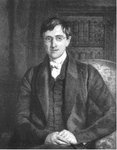a) La encíclica Quanta cura de 1864 y el Syllabus
Según Gladstone, la encíclica condenaba a todos los que mantienen la libertad de prensa, de conciencia y de culto: "Pontiff has condemned free speech, free writing, a free press, toleration of non-conformity, liberty of conscience,". Newman le responderá que la Iglesia no condena todas las libertades así como el Estado no permite todas las libertades. Que la libertad y sus condiciones admiten una gradualidad:
The very idea of political society is based upon the principle that each member of it gives up a portion of his natural liberty for advantages which are greater than that liberty; and the question is, whether the Pope, in any act of his which touches us Catholics, in any ecclesiastical or theological statement of his, has propounded any principle, doctrine, or view, which is not carried out in fact at this time in British courts of law, and would not be conceded by Blackstone. I repeat, the very notion of human society is a relinquishment, to a certain point, of the liberty of its members individually, for the sake of a common security. Would it be fair on that account to say that the British Constitution condemns all liberty of conscience in word and in deed?[1]
Continúa argumentando que a los católicos en Inglaterra se les niega la libertad en el ejercicio de su religión de diversas maneras en las leyes inglesas, pero que no se quejan, porque se debe poner límites a las libertades inocentes.
Respecto de la libertad de opinión y de prensa, en Inglaterra se practica. No se puede hablar a la ligera del Soberano, y el Estado ejerce un control sobre la prensa con la Ley de libelo, con la cual se pueden incurrir en penas. La Iglesia no niega la libertad, sino el libertinaje, como lo hace cualquier Estado:
All that the Pope has done is to deny a universal, and what a universal! a universal liberty to all men to say out whatever doctrines they may hold by preaching, or by the press, uncurbed by church or civil power. Does not this bear out what I said in the foregoing section of the sense in which Pope Gregory denied a "liberty of conscience"? It is a liberty of self-will. What if a man's conscience embraces the duty of regicide? or infanticide? or free love? You may say that in England the good sense of the nation would stifle and extinguish such atrocities. True, but the proposition says that it is the very right of every one, by nature, in every well constituted society.[2]
En cuanto al Syllabus, Newman centrará su defensa en limitar el alcance de las afirmaciones en él contenidas. Insiste en el carácter de índice del documento, y que el peso real de cada frase en él contenido está en su contexto, en el texto de origen. De hecho, eso es lo que es el Syllabus, porque cada frase en él condenada como un error moderno remite en nota al texto del cual procede la condena de la Iglesia. Es ahí donde se ve el alcance de cada afirmación.
The Syllabus then has no dogmatic force; it addresses us, not in its separate portions, but as a whole, and is to be received from the Pope by an act of obedience, not of faith, that obedience being shown by having recourse to the original and authoritative documents, (Allocutions and the like,) to which it pointedly refers. Moreover, when we turn to those documents, which are authoritative, we find the Syllabus cannot even be called an echo of the Apostolic Voice; for, in matters in which wording is so important, it is not an exact transcript of the words of the Pope, in its account of the errors condemned,—just as is natural in what is professedly an index for reference.[3]
Es entendiendo así el Syllabus como quedan matizadas ciertas afirmaciones que a Gladstone le parecían peligrosas para la integridad de Inglaterra. El Syllabus hace afirmaciones siempre de carácter universal que muchas veces son inferencias de condenas particulares a lugares y situaciones concretas. A ellas hay que remitirse. Uno de tantos ejemplos es el siguiente:
For instance, take his own 16th (the 77th of the "erroneous Propositions"), that, "It is no longer expedient that the Catholic Religion should be established to the exclusion of all others." When we turn to the Allocution, which is the ground of its being put into the Syllabus, what do we find there? First, that the Pope was speaking, not of States universally, but of one particular State, Spain, definitely Spain; secondly, that he was not noting the erroneous proposition directly, or categorically, but was protesting against the breach in many ways of the Concordat on the part of the Spanish government; further, that he was not referring to any work containing the said proposition, nor contemplating any proposition at all; nor, on the other hand, using any word of condemnation whatever, nor using any harsher terms of the Government in question than an expression of "his wonder and distress." And again, taking the Pope's remonstrance as it stands, is it any great cause of complaint to Englishmen, who so lately were severe in their legislation upon Unitarians, Catholics, unbelievers, and others, that the Pope merely does not think it expedient for every state from this time forth to tolerate every sort of religion on its territory, and to disestablish the Church at once? for this is all that he denies. As in the instance in the foregoing section, he does but deny a universal, which the "erroneous proposition" asserts without any explanation.[4]
[1] NEWMAN, John H., Certain Difficulties ,p.269-270.
[2] o.c. , p. 274-275.
[3] o.c., p.281
[4] o.c., p.286
miércoles, 10 de octubre de 2007
Suscribirse a:
Enviar comentarios (Atom)


No hay comentarios:
Publicar un comentario